- Home
- Chuck Wendig
Wanderers
Wanderers Read online
Wanderers is a work of fiction. Names, characters, places, and incidents either are products of the author’s imagination or are used fictitiously. Any resemblance to actual persons, living or dead, events, or locales is entirely coincidental.
Copyright © 2019 by Terribleminds LLC
All rights reserved.
Published in the United States by Del Rey, an imprint of Random House, a division of Penguin Random House LLC, New York.
DEL REY and the HOUSE colophon are registered trademarks of Penguin Random House LLC.
Hardback ISBN 9780399182105
International edition ISBN 9781984820792
Ebook ISBN 9780399182112
randomhousebooks.com
Book design by Susan Turner, adapted for ebook
Cover design and illustration: David G. Stevenson, based on an image © Tony Watson/Arcangel Images
v5.4
ep
Contents
Cover
Title Page
Copyright
Epigraph
Prelude: The Comet
Part One: The Brood
Chapter 1: The First Sleepwalker
Chapter 2: And Then There Were Two
Chapter 3: Black Swan
Chapter 4: Pop Goes the Weasel
Chapter 5: The Meal After Lunch, Accompanied by Drinks
Chapter 6: The Day’s End
Chapter 7: Obligations
Chapter 8: Dawn Breaks
Chapter 9: The Fly in the Ointment
Chapter 10: Some Secret Purpose
Chapter 11: The Exploded Man’s Wife
Chapter 12: Road Rash
Chapter 13: Test of Faith
Interlude: The Life and Death of Jerry Garlin
Part Two: Shepherds and Flock
Chapter 14: God’s Light
Chapter 15: The Storm
Chapter 16: WWJD
Chapter 17: Sirens and Screams
Chapter 18: The Shimmer
Chapter 19: Salt and Light
Chapter 20: The Glow
Chapter 21: One Mile Through Waldron
Chapter 22: Just Asking Questions
Chapter 23: Apophenia
Chapter 24: These Are the People in Your Neighborhood
Interlude: Jerry Garlin, or How the End Begins
Part Three: The Frog and the Mouse
Chapter 25: Motherfucking Rock God
Chapter 26: Beware of Owner
Chapter 27: Homeland Security
Chapter 28: Brightness and Nowhere
Chapter 29: We Eat What We Hunt
Chapter 30: Under Pressure
Chapter 31: Spears to Splinters
Chapter 32: Get the Man a Stage
Chapter 33: The Clash
Chapter 34: One Broken Cookie
Chapter 35: Fireworks on a Birthday Cake
Chapter 36: The Sinner’s Hour
Chapter 37: Bugs, Bats, Stars, Hearts
Interlude: Daria Stewart and the Medicinal Dose
Part Four: The Signal and the Sickness
Chapter 38: The First Little Betrayal
Chapter 39: If It Bleeds, It Leads
Chapter 40: (I Can’t Get No) Satisfaction
Chapter 41: It All Comes Out in the Wash
Chapter 42: The Ultimate Answer
Chapter 43: A Helluva Drug
Chapter 44: The Rally
Chapter 45: Terminal Diagnosis
Chapter 46: The Walking Ghost Phase
Chapter 47: An Agitation of Angels
Chapter 48: Hero, Coward, Tool, and Fool
Chapter 49: Back at the Flock
Chapter 50: Of Gods and Men
Chapter 51: Breaking News
Interlude: Ten Photographs
Part Five: White Mask
Chapter 52: Get Off Your Horse and Drink Your Milk
Chapter 53: The Kept Man
Chapter 54: The Fungus Among Us
Chapter 55: No Exit
Chapter 56: The Bridge
Chapter 57: An Accounting
Chapter 58: This Way to the Great Egress
Chapter 59: Fractures
Chapter 60: Meet Me in Saint Louie
Chapter 61: Hibernacula
Interlude: The Girl
Part Six: Last Days of the Long Walk
Chapter 62: Pavement Ends
Chapter 63: The Whetting Stone
Chapter 64: The Ritual
Chapter 65: Mothers and Fathers of Intelligent Artifice
Chapter 66: Repeat After Me
Chapter 67: Vegas, Baby
Chapter 68: Less a Window, More a Wall
Chapter 69: He Kindly Stopped for Me
Chapter 70: The Only Way Out Is Through
Chapter 71: Revisionist History
Chapter 72: And the Devil Will Appear
Interlude: Towers Fall, Tipping Point, and Cascade
Part Seven: Ouray
Chapter 73: Camera Obscura
Chapter 74: Broken Wing
Chapter 75: The Black Door
Chapter 76: The Welcoming Committee
Chapter 77: Miles to Go Before I Sleep
Chapter 78: There Is No Spoon, and What Does Tasty-Wheat Taste Like, Anyway?
Chapter 79: Tinnitus
Chapter 80: Preparations for War
Chapter 81: Reckoning
Chapter 82: The Outsider
Chapter 83: Knock-Knock
Chapter 84: Into the Black
Chapter 85: The Siege
Chapter 86: The Black Room
Chapter 87: The Strengthening Glow
Chapter 88: Strange Reunions
Chapter 89: The Mountain Man
Chapter 90: Rock Out with Your Cock Out
Interlude: Mother and Daughter
Part Eight: The Singularity of Our Uniqueness
Chapter 91: The Accounting
Chapter 92: Breaking Bread
Chapter 93: To Be or Not to Be
Chapter 94: The Ascent
Chapter 95: The Others
Chapter 96: The Remains
Dedication
Acknowledgments
By Chuck Wendig
About the Author
A wilderness, in contrast with those areas where man and his works dominate the landscape, is hereby recognized as an area where the earth and its community of life are untrammeled by man, where man himself is a visitor who does not remain.
—The Wilderness Act of 1964
THE WOMAN WHO DISCOVERED THE comet, Yumiko Sakamoto, age twenty-eight, was an amateur astronomer in Okayama Prefecture, in the town of Kurashiki. She found it on a lark, looking instead for an entirely different comet—a comet that was expected to strike Jupiter.
/> Yumiko Sakamoto said that the discovery changed her life. In an interview with the Asahi Shimbun newspaper, she said: “Up until now I have been focused too much on material things—getting a good job, finding a good husband—but I am relinquishing such shallow pursuits as romance and career. I will go back to school and learn more about our world and the cosmos beyond it. Not for financial gain, but because the pursuit of knowledge is itself noble.”
She also said she was joining the growing asexual and aromantic community in Japan. She felt that the world was “overpopulated” already and did not need her to add to its “burden.”
The comet—named Comet Sakamoto after her—passed within 0.1 AU (astronomical unit) of the earth on June 2. Not close enough to be a danger, but close enough that one could see it with the naked eye—and close enough to earn it the Great Comet moniker, joining other famous comets such as Halley’s Comet and Hale-Bopp.
Yumiko Sakamoto was going to begin her new academic study the following October, but did not live long enough to see the chance. She died of a brain aneurysm the night the comet passed overhead.
Last night’s amateur astronomers got a treat in the form of clear skies, a new moon, and Comet Sakamoto. The last three Great Comets were Lovejoy in 2011, McNaught in 2007, and the famous—or infamous?—Hale-Bopp in 1997, which of course spawned the Heaven’s Gate cult, whose members committed mass suicide in the belief it would allow them to hitch a ride with an extraterrestrial spaceship following that comet. You’re listening to Tom Stonekettle of Stonekettle Radio, 970 BRG.
—Stonekettle Radio Show, 970AM WBRG, Pittsburgh
JUNE 3
Maker’s Bell, Pennsylvania
SHANA STOOD THERE LOOKING AT her little sister’s empty bed, and her first thought was: Nessie ran away again.
She called to her a few times. Honestly, after Nessie had stayed up late last night to watch the comet through Dad’s shitty telescope, Shana figured the younger girl would still be in bed, snoring up little earthquakes. She wasn’t sure where the hell else Nessie could be—Shana had been up for an hour already, making their lunches, finishing the laundry, putting the trash and recycling together so she could haul it up the long driveway for tomorrow’s pickup. So she knew Nessie wasn’t in the kitchen. Maybe she was in the upstairs bathroom.
“Nessie?” She paused. Listened. “Nessie, c’mon.”
But nothing.
Again the thought: Nessie ran away again.
It didn’t make much sense. First time Nessie ran away, that made sense. They’d just lost their mother—lost her in a very literal way. The four of them went to the grocery store, and only three of them came back. They feared Mom had been taken and hurt, but eventually security cameras from the Giant Eagle showed that nobody kidnapped her; she strolled out the automatic doors like nothing was wrong and then walked out of their lives for good. Mom became a big question mark stuck in their cheeks like a fishhook.
But it was clear that their mother didn’t want to be a part of their lives anymore. That, Shana knew even then, had been a long time coming, but the realization did not hit Nessie—and still had not reached her, even now. Nessie believed then that it was Dad’s fault. And maybe Shana’s, too. So two years ago almost to the day, after school was done for the year, Nessie packed a backpack full of canned goods and bottled water (plus a couple of candy bars), and ran away.
They found Nessie four hours later at the wooden bus shelter on Granger, hiding from a sudden rain squall. Shivering like a stray puppy. When Dad picked her up she kicked and thrashed, and it was like watching a wrestler try to pin a tornado. But then he gave up, said to her, “You want to run away, you run away, but if you’re thinking of going after your mother, I don’t think she wants to be found.”
It was like watching a glass of water tip in slow motion. Nessie collapsed in his arms and wept so hard she could only catch her breath in these keening, air-sucking hitches. Her shoulders shook and she pressed both hands under her armpits as if hugging herself. They got her home. She slept for two days and then, slowly but surely, came back to life.
That was two years ago.
Today, though, Shana could not figure out why Nessie would want to run away again. Girl was fifteen now and hadn’t hit the wall like Shana had at that age—as Dad put it, Shana “went full teenager.” Mopey and mad and hormones like a kicking horse. Shana was almost eighteen, now. She was better these days. Mostly.
Nessie was still all right, hadn’t turned into a werewolf. Still happy. Still optimistic. Eyes bright like new nickels. She had a little notebook, in which she wrote all the things she wanted to do (scuba dive with sharks, study bats, knit her own slippers like Mom-Mom used to do), all the places she wanted to go (Edinburgh, Tibet, San Diego), all the people she wanted to meet (the president, an astronaut, her future husband). She said to Shana one day, “I heard that if you complain it reprograms your brain like a computer virus and it just makes you more and more unhappy, so I’m going to stay positive because I bet the opposite is true, too.”
That notebook sat there on her empty bed. Next to the bed was an open box—Nessie had gotten some package in the mail, some science thing she must’ve ordered. (Shana borrowed a part of it, a little test tube, to hold weed.) Her daffodil-yellow sheets looked rumpled and slept-in. Her pink pillow still showed her head-dent.
Shana peeked at the notebook. Nessie had started a new list: JOBS I MIGHT LIKE?? Included: zookeeper, beekeeper, alpaca farmer, photographer. Photographer? Shana thought. That’s my bag. A weird flare of anger lanced through her. Nessie was good at everything. If she decided to do the thing that Shana wanted to do, she’d do it better and that would suck and they’d hate each other forever. (Well, no. Shana would hate Nessie. Nessie would love her unconditionally because that was Nessie.)
Shana called out for her again. “Ness? Nessie?” Her voice echoed and nothing but the echo answered. Shit.
Dad was probably already in the so-called milking parlor (he said if they’re going to be part of the artisanal cheese movement here in Pennsylvania they needed to start talking like it, damnit), and he would be expecting Ness and Shana to staff the little shop up by the road. Then eventually he’d come get one of them to head into the cheese barn to check the curds on that Gouda or get the blues draining—then mix the silage and feed the cows and ah, hell, the vet was coming today to look at poor Belinda’s red, crusty udders and—
Maybe that’s why Nessie ran away. School was out already and summer vacation wasn’t much of one: Everything was work, work, work. (Shana wondered if Nessie had the right idea. She could run away, too. Even for the day. Call up her buddy Zig in his Honda, smoke some weed, read comic books, talk shit about the seniors who just graduated…)
(God, she had to get out of here.)
(If she didn’t get out of here soon, she’d stay here forever. This place felt like quicksand.)
Of course, Nessie was too good a girl to have run away again, so maybe she got the jump on Shana and was already out in the shop. Little worker bee, that one. What was the song on Dad’s old REM album? “Shiny Happy People”? That was Nessie.
Shana’d already eaten, so she went in search of the little clip-on macro lens she used over her phone’s camera to let her take photos of things real close-up, magnified. Little worlds revealed, the micro made macro. She didn’t have a proper camera, but she was saving up to get a DSLR one day. In the meantime, that meant using the phone. Maybe she’d find something in the stable or in the cheesemaking room that would look cool up close: flaking rust, the red needle in the thermometer, the bubbles or crystals in the cheese itself.
It hit her where she’d left the lens last time—she was taking pictures of a house spider hanging in her window, and she left the lens on the sill. So she went there to grab it—
Something outside caught her eye. Movement up the driveway. One of the cows loose was h
er first thought.
Shana headed to the window.
Someone was out there, walking.
No. Not someone.
Little dum-dum was halfway up the driveway in her PJ pants and pink T-shirt. Barefoot, too, by the look of it. Oh, what the hell, Nessie?
Shana ran to the kitchen, forgetting her lens. She hurriedly popped on her sneakers and ran out the door to the back porch, nearly tripping on the one sneaker that wasn’t all the way on yet, but she quick smashed her heel down into the shoe and kept on running.
She thought to yell to her little sister, but decided against it. No need to draw Dad’s attention. He’d see they weren’t out in the shop yet and give them a ration of hot shit about it, and Shana didn’t want to hear it. This was not a morning for nonsense, and already the nonsense was mounting.

 Vultures
Vultures Mockingbird
Mockingbird Wanderers
Wanderers The Cormorant
The Cormorant Empire's End: Aftermath (Star Wars)
Empire's End: Aftermath (Star Wars)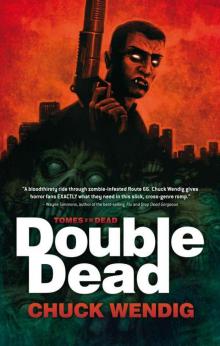 Double Dead
Double Dead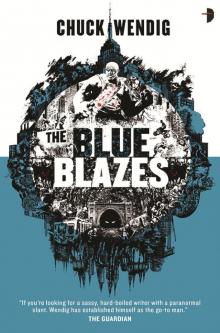 The Blue Blazes
The Blue Blazes 250 Things You Should Know About Writing
250 Things You Should Know About Writing Irregular Creatures
Irregular Creatures The Raptor & the Wren
The Raptor & the Wren Aftermath: Star Wars
Aftermath: Star Wars Blackbirds
Blackbirds The Hunt
The Hunt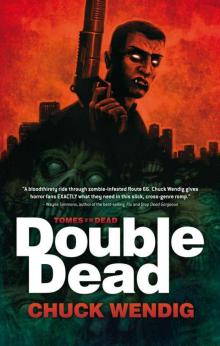 Tomes of the Dead (Book 1): Double Dead
Tomes of the Dead (Book 1): Double Dead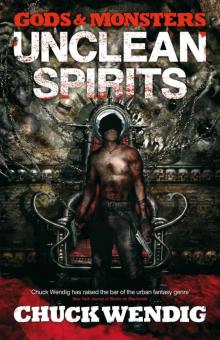 Gods and Monsters: Unclean Spirits
Gods and Monsters: Unclean Spirits The Harvest
The Harvest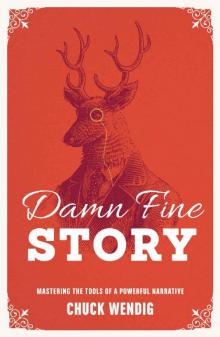 Damn Fine Story: Mastering the Tools of a Powerful Narrative
Damn Fine Story: Mastering the Tools of a Powerful Narrative ZerOes
ZerOes Thunderbird
Thunderbird The Hellsblood Bride
The Hellsblood Bride Double Dead: Bad Blood
Double Dead: Bad Blood Life Debt
Life Debt